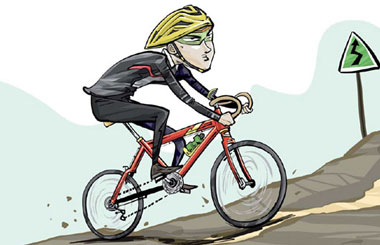CSL not shy about opening vault
Updated: 2016-03-04 08:38
By Sun Xiaochen(China Daily)
|
|||||||||
|
Chinese Super League's new season, which kicks off on Friday, is set to attract global attention as the clubs spent 334 million euros ($363 million) during the recent transfer window, attracting a number of renowned foreign players. Clockwise: Alex Teixeira of Jiangsu Suning, Jackson Martinez of Guangzhou Evergrande, Ramires of Jiangsu, Gervinho of Hebei China Fortune, Fredy Guarin of Shanghai Greenland Shenhua, Ezequiel Lavezzi of Hebei, Renato Augusto of Beijing Guo'an, Stephane M'Bia of Hebei, Jadson Rodrigues of Tianjin Quanjian, Ersan Gulum of Hebei, Ralf of Beijing, Gael Kakuta of Hebei, Gil of Shandong Luneng and Geuvanio of Tianjin.Xinhua |
Chinese league has richest spenders in world soccer
The cash splash triggered by Chinese soccer clubs in their rush to sign elite foreign talent is making global headlines - but more needs to be done to rejuvenate the game's domestic profile.
While international superstars like Barcelona's Lionel Messi and Real Madrid's Cristiano Ronaldo prepare to clash in the knockoff stage of Europe's Champions League, the Chinese Super League season will be competing for a share of the spotlight when the new campaign kicks off on Friday with Guangzhou R&F hosting Hebei China Fortune.
Inspired by President Xi Jinping's vision of transforming China into a global soccer power, CSL clubs spent a staggering 334 million euros ($363 million) during the recent transfer window, luring a veritable foreign legion of players to ply their trade in China.
That was the highest expenditure of all leagues worldwide, according to German website Transfermarkt.
Former Chelsea midfielder Ramires of Brazil, Argentine international Ezequiel Lavezzi, ex-Atletico Madrid striker Jackson Martinez and Brazilian attacking midfielder Alex Teixeira are among the high-profile foreigners joining CSL in their prime. Teixeira cost Jiangsu Suning a CSL record 50 million euros from Ukraine's Shakhtar Donetsk.
One year ago the State Council, China's Cabinet, issued a national reform plan aimed at resuscitating the game's sputtering image through professional league development and youth promotion.
That initiative has helped rebrand the CSL as an appealing destination for foreigner players - particularly from South America - anxious to earn lucrative paychecks while experiencing Chinese culture.
Ramires, who cost Jiangsu Suning 28 million euros, said both the financial windfall and the CSL's improving level of competition influenced his decision.
"I chose playing for Jiangsu because I spoke a lot to (Brazil teammate) Paulinho, who plays for Guangzhou Evergrande," the 28-year-old told Chinese website pptv.com.
"We met a lot in England, and he spoke very highly about football in China."
Paulinho joined Evergrande last summer from Premier League side Tottenham Hotspur on a four-year deal worth 14 million euros. In November he helped Guangzhou win a second AFC Champions League title, together with compatriot Ricardo Goulart.
Chinese Football Association President Cai Zhenhua sees the influx of foreigners as a plus, but also expects domestic clubs to boost their investment in homegrown talent.
"Signing big names helps improve the CSL brand globally and it is a good way to attract fans and media, but the cultivation of local talent should be more of a priority for substantial progress down the road," Cai said.
Mark Dreyer, a Briton who runs the China Sports Insider website, agreed.
"If the money now coming into the Chinese game can be used by clubs to overhaul their youth academies, for example, then real benefits could be seen further down the road," said Dreyer. "But at the moment, much of that money is being paid out to foreign stars that will be gone in a few years."
The not-too-distant example of Shanghai Shenhua parting ways with star imports Didier Drogba and Nicolas Anelka for lack of chemistry with local players and payment disputes in 2012 remains a tough object lesson for other clubs.
Huang Bowen, Evergrande's Chinese national midfielder, said a concerted effort to gel with the homegrown roster helps foreigners assimilate - and pays dividends for the team.
"Only by bonding with us can they maximize their strength. Meanwhile, traveling, practising and playing side by side with those foreign pros helps us improve as well," said Huang.
The CSL's current semi-administrative management also needs to be revamped in order to establish a more "professional" image, according to Tan Jianxiang, a sports sociology professor at South China Normal University.
Tan said the CFA must relinquish its domineering role in the Chinese Super League Company to allow decisions made by club shareholders and professional executives to take precedence.
"As long as the league is both supervised and operated primarily by governmental officials, it won't be as professional as it is supposed to ... like the Premier League running in parallel with the FA," Tan said.
Cai said an independent body formed with club shareholders and professionals will be established to run the CSL this year.
It's all about dollars and sense
The government's effort to boost China's sports industry has translated into major funding for soccer, despite challenges for investors to make ends meet.
The ever-increasing cost of the professional game was underscored by the more than $300 million spent by Super League clubs during the recent transfer window, but soaring acquisition and endorsement deals indicate enthusiasm for investment remains high.
The whopping 8 billion yuan ($1.2 billion) broadcasting deal signed between the league and China Sports Media Co Ltd to cover the next five years suggests clubs will have more funds for youth development, player transfers and daily operations - but some disparity remains.
According to research published by Vning Media Brand Consulting Agency last November, CSL's average attendance increased to more than 22,000 last year, ranking sixth among all major international leagues, while the total audience for televised games was 400 million viewers.
Those big numbers attracted 18 investors and promoters, who contributed more than 500 million yuan in sponsorship income.
Still, 16 league clubs lost money, with most of their 1.5 billion yuan deficit due to escalating player transfers, salaries, facility maintenance and security and youth development.
That challenge hasn't intimidated newcomers, as Suning Commerce Group Co, the country's major electronics retailer, last year purchased CSL Jiangsu Suning from Sainty Corp for a reported 500 million yuan.
For this season, which kicks off on Friday night, the league has attracted a number of new partners, including Swiss watchmaker TAG Heuer and Kingworld (Beijing) Technology, the league's new app developer.
Adam Zhang, founder of Key-Solution Sports Consultancy, said the country's national strategy to grow the sports industry amid downward pressure has become the main motive for companies outside the traditional sector to jump in.
sunxiaochen@chinadaily.com.cn
Today's Top News
Spanish Princess testifies in tax fraud trial
Women driving growth of O2O in China
Trump, Clinton scoop up key wins on 'Super Tuesday'
British PM threatened with 'no confidence vote'
70,000 may become trapped in Greece
'Grow people' for long-term China-UK relations
Points of view
Small island makes a big difference
Hot Topics
Lunar probe , China growth forecasts, Emission rules get tougher, China seen through 'colored lens', International board,
Editor's Picks

|

|

|

|

|

|







